Open source or open research movement allows anybody to use, study, modify, and distribute software or research projects freely and for any purpose (reference). As much as open source is about sharing and distribution of software, it is equally important to highlight practices that support people’s interactions with the project as well as the communities that are built around a common interest and mission. Volunteer contributions are central to the success of open source projects who use frameworks for project peer-production and collaborations. These contributions can be witnessed in the context of coding, reviewing, documenting, error reporting, bug fixing, method selection, mentorship, training, project maintenance and other community interactions. In this chapter, we explore the “shared ownership” models to highlight that the open source projects should be owned by the community of contributors who work to ensure their development and sustainability.

Figure 1:Open source collaborative pathway compared to closed source projects that are driven by institute’s personal motivation. Picture credit: The Turing Way Community, & Scriberia. (2020, November). Illustrations from the Turing Way book dashes. Zenodo. Community & Scriberia (2020)
Motivation¶
A shared sense of ownership is important for motivating contributors to collaborate in a project as they align their interests with the project’s goals. The concept of shared or collective ownership is widely practised in open source (see definition for collective ownership), but unfortunately, it is not always described in the projects. Often it is vaguely communicated or assumed either based on the contributors’ time or the scale of their contributions. In the long term, it is not helpful for most contributors who don’t know if their contributors are valued, acknowledged or rewarded in the project.
In the subchapter Project Ownership, we explore what project ownership means in an open source world, in the subchapter Shared Ownership Models, we discuss different models that are out there and in the subchapter Challenges with Applying Ownership Models Retroactively, we discuss challenges that exist in adopting them in open source projects. Ultimately, in the subchapter Nudging for a Better Default, we nudge researchers to apply good practices for establishing shared ownership in their open source projects.
This chapter was originally discussed and written in an online post by Malvika Sharan, Warrick Ball, Ben Krikler, and Andrew Brown as a part of the Collaboration Workshop 2021 speed blog series hosted by Software Sustainability Institute.
- Community, T. T. W., & Scriberia. (2020). Illustrations from the Turing Way book dashes. Zenodo. 10.5281/ZENODO.4323154